
Transactions of the Indian Ceramic Society
Scope & Guideline
Unveiling Insights in Ceramic Science
Introduction
Aims and Scopes
- Advanced Ceramic Materials:
Research on the development and characterization of novel ceramic materials, including piezoelectric ceramics, superconductors, and high-performance composites. - Ceramic Processing Technologies:
Studies on various processing methods such as sintering, extrusion, and sol-gel techniques, aimed at optimizing the physical and mechanical properties of ceramics. - Environmental Applications:
Investigations into the use of ceramics for environmental remediation, including wastewater treatment and the utilization of industrial waste in ceramic production. - Corrosion and Wear Resistance:
Research focused on enhancing the corrosion resistance and wear properties of ceramic materials, particularly for industrial applications. - Characterization Techniques:
Utilization of advanced characterization methods, including spectroscopy, microscopy, and mechanical testing, to analyze the properties and behaviors of ceramic materials. - Sustainable and Green Technologies:
Exploration of eco-friendly materials and processes in ceramics, including the use of recycled materials and sustainable manufacturing practices.
Trending and Emerging
- High-Performance Ceramics:
There is an increasing focus on ceramics that offer superior mechanical, thermal, and electrical properties, particularly for applications in aerospace and defense. - Nanostructured Ceramics:
The trend towards the use of nanotechnology in ceramics is growing, with studies exploring the properties and applications of nanostructured ceramic materials. - Smart and Functional Ceramics:
Research on smart ceramics that incorporate functionalities such as self-healing, sensing, and energy harvesting is gaining momentum, reflecting a broader interest in multifunctional materials. - Recycling and Waste Utilization:
An emerging theme is the valorization of industrial and agricultural waste in ceramic production, promoting sustainability and resource efficiency in ceramic manufacturing. - Digital Fabrication Techniques:
The integration of digital fabrication methods, such as 3D printing, in ceramic production is becoming increasingly prominent, enabling complex geometries and custom applications.
Declining or Waning
- Traditional Ceramic Materials:
Research on conventional ceramic materials has diminished as the focus shifts toward advanced and multifunctional ceramics with enhanced properties. - Basic Structural Studies:
There has been a noticeable decline in purely structural studies without functional applications, as researchers increasingly prioritize practical applications of ceramics. - Low-Technology Ceramics:
Themes related to low-tech ceramics, such as simple pottery and basic earthenware, are becoming less frequent as the journal emphasizes high-tech and innovative ceramic solutions.
Similar Journals
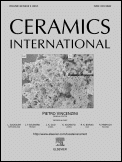
Ceramics International
Discovering the art and science of ceramics.Ceramics International is a premier journal published by ELSEVIER SCI LTD, focusing on advancing the field of materials science with a specific emphasis on ceramics and composites. With an impressive impact factor and a top-tier standing in several critical categories, including Q1 rankings in Ceramics and Composites, Electronic, Optical and Magnetic Materials, and Materials Chemistry, this journal serves as a crucial resource for researchers and professionals alike. Established in 1981, it has consistently showcased cutting-edge research in various domains, including surfaces, coatings, and process chemistry technologies, making it invaluable for those advancing theoretical and practical knowledge in these areas. While access is through subscription, the journal’s rich content, profound insights, and rigorous peer-review process ensure high-quality articles that contribute meaningfully to the scientific community. By fostering innovation and collaboration through rigorous research, Ceramics International stands out as an authoritative source for those dedicated to the evolution of materials science.
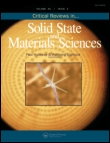
CRITICAL REVIEWS IN SOLID STATE AND MATERIALS SCIENCES
Pioneering Reviews for a Dynamic FieldCRITICAL REVIEWS IN SOLID STATE AND MATERIALS SCIENCES, published by Taylor & Francis Inc, is a prestigious journal dedicated to advancing the field of materials science through comprehensive reviews and critical analysis of existing literature. With an ISSN of 1040-8436 and an E-ISSN of 1547-6561, this journal serves as a vital resource for researchers, professionals, and students seeking in-depth understanding of solid-state phenomena and materials applications. Renowned for its high visibility in the academic community, it holds a Q1 ranking across multiple categories including Chemical Engineering, Condensed Matter Physics, and Physical and Theoretical Chemistry, showcasing its impact and relevance in the field. The journal spans its publication years from 1977 to 2024 and is highly regarded, holding prominent positions in Scopus rankings, making it a leading platform for disseminating critical insights and advancing knowledge in materials science. Although it is not an open-access journal, its rigorous peer-review process ensures the highest quality of articles, solidifying its status as a cornerstone for anyone engaged in materials research.
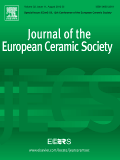
Journal of the European Ceramic Society
Driving Progress in Ceramic ResearchThe Journal of the European Ceramic Society, published by Elsevier, is a premier academic periodical dedicated to the cutting-edge advancements in the fields of ceramics and composites, as well as materials chemistry. With an impressive impact factor that places it in the top quartile (Q1) of its category, it ranks #33 out of 317 in Materials Science and #16 out of 127 in Ceramics and Composites, showcasing its strong influence in the scientific community. Established in 1989 and set to converge until 2025, this journal serves as a critical platform for researchers and professionals to disseminate their findings, share ideas, and foster collaboration in the rapidly evolving area of ceramic materials. Although it does not offer Open Access options, the journal ensures rigorous peer review and maintains high standards for publication, making it an essential resource for students, academics, and industry experts who are pushing the boundaries of material science.
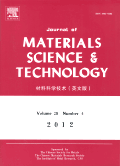
Journal of Materials Science & Technology
Driving Research in Multidisciplinary Materials ScienceThe Journal of Materials Science & Technology, published by JOURNAL MATER SCI TECHNOL in China, is a leading forum for the latest research in the multidisciplinary field of materials science. With the ISSN 1005-0302 and E-ISSN 1941-1162, this esteemed journal boasts an impressive impact factor and has established itself as a vital resource for professionals, researchers, and students alike. Covering a wide range of topics, including ceramics, composites, materials chemistry, mechanical engineering, and polymers, it has achieved a coveted Q1 ranking in multiple categories as of 2023, reflecting its position in the top tier of scholarly publications. Notably, the journal excels in its Scopus ranks, placing within the top 5% in categories such as Metals and Alloys and Mechanical Engineering. Aiming to foster knowledge and innovation in material development and application, the journal is committed to facilitating groundbreaking research and collaborations that propel the field forward. With its convergence of insights from 1993 to 2025, the Journal of Materials Science & Technology remains an indispensable resource for the advancement of materials science.

Advances in Materials and Processing Technologies
Pioneering Innovations in Materials ScienceAdvances in Materials and Processing Technologies, published by Taylor & Francis Ltd, is a leading academic journal that serves as a dynamic platform for the dissemination of cutting-edge research in the fields of industrial and manufacturing engineering, materials science, and mechanics of materials. With an ISSN of 2374-068X and an E-ISSN of 2374-0698, this journal boasts a commendable impact factor and is recognized for its contribution to advancing knowledge and innovation in processing technologies. The journal is classified within the Q2 category for its fields, indicating its significant standing amongst peers as reflected in its Scopus rankings, where it occupies the 63rd percentile in Industrial and Manufacturing Engineering and the 58th percentile in Mechanics of Materials. As an open-access platform, it aims to foster accessibility to high-quality research outputs and encourages the dissemination of findings from 2015 to 2024. The journal is headquartered in the United Kingdom and plays a pivotal role in supporting researchers, professionals, and students who are committed to the advancement of materials science and processing methodologies.
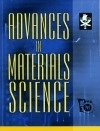
Advances in Materials Science
Transforming Ideas into Cutting-edge ApplicationsAdvances in Materials Science, published by SCIENDO, is a pivotal journal in the field of materials science that focuses on the latest developments and breakthroughs in the study and application of innovative materials. With a commitment to advancing knowledge across various sub-disciplines, this journal provides a platform for researchers, professionals, and students to share their findings, explore new methodologies, and discuss the implications of materials science on technology and industry. The journal, indexed under the ISSN 2083-4799 and E-ISSN 2083-4799, promotes open dissemination of research, encouraging a collaborative approach to problem-solving across disciplines. Its emphasis on high-quality, peer-reviewed articles positions it as an influential resource within the academic community, driving forward the boundaries of what is possible in materials science. Advances in Materials Science continues to be an essential read for anyone dedicated to understanding and innovating in the materials domain.
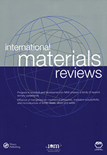
INTERNATIONAL MATERIALS REVIEWS
Elevating Standards in Materials ResearchINTERNATIONAL MATERIALS REVIEWS, published by SAGE Publications Inc, is a leading journal dedicated to the comprehensive analysis of contemporary research in the fields of materials chemistry, mechanical engineering, mechanics of materials, and the study of metals and alloys. With an impressive impact factor and a Q1 ranking across multiple categories such as Materials Chemistry and Mechanical Engineering in 2023, it ranks amongst the top journals for innovative materials research. The journal has a long-standing history since its inception in 1987 and continues to serve as a crucial resource for academics and professionals alike. Although it is not open access, it is renowned for its rigorous peer-review process and its commitment to disseminating high-quality materials science research globally. Researchers, students, and industry professionals benefit greatly from the journal's insightful reviews, both for the advancement of theoretical knowledge and practical applications within the fast-evolving materials field.
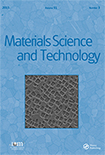
MATERIALS SCIENCE AND TECHNOLOGY
Pioneering Research in Materials Engineering and ApplicationsMATERIALS SCIENCE AND TECHNOLOGY is a leading journal published by SAGE PUBLICATIONS INC, focusing on the interdisciplinary advancements in the field of materials science. Since its inception in 1984, the journal has provided a platform for researchers and industry professionals to present innovative findings through rigorous peer-reviewed articles. The journal holds a commendable impact factor and categorizes itself within the prestigious Q2 rank in various domains such as Condensed Matter Physics, Materials Science, Mechanical Engineering, and Mechanics of Materials according to the 2023 Quartiles. With no Open Access option, it primarily serves as a repository for in-depth studies and advancements that push the boundaries of materials engineering and application. Located in the United Kingdom, at 2455 TELLER RD, THOUSAND OAKS, CA 91320, the journal continues to attract a global readership, making it indispensable for academics, researchers, and students who aim to stay at the forefront of materials innovation.
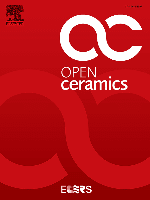
Open Ceramics
Advancing the Future of Ceramic InnovationOpen Ceramics is a pioneering journal published by Elsevier, dedicated to the field of materials science, with a particular focus on ceramics and composites. Launched in 2020, this Open Access journal aims to facilitate unrestricted dissemination of cutting-edge research findings while promoting innovative developments in the utilization of ceramic materials across various applications. As of 2023, Open Ceramics has established a commendable presence in several key categories, achieving Q3 in Biomaterials and Q2 rankings in Ceramics and Composites, Electronic, Optical and Magnetic Materials, and Materials Chemistry. The journal's broad scope appeals to a diverse audience of researchers, professionals, and students interested in the advancements within this essential domain of materials science. With a commitment to quality and relevance, Open Ceramics provides a platform for rigorous peer-reviewed research, thereby enhancing the global dialogue in the field and contributing to the ongoing progress of materials innovation.
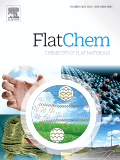
FlatChem
Connecting Researchers to Transformative Material DiscoveriesFlatChem, an esteemed journal published by ELSEVIER, serves as a premier platform for disseminating high-quality research in the dynamic fields of ceramic and composite materials, electronic and optical materials, materials chemistry, and surfaces, coatings, and films. Since its inception in 2017, the journal has garnered a robust reputation, evidenced by its rank in the top quartile (Q1) across multiple categories, including a commendable rank of #25/127 in Ceramics and Composites and #49/284 in Electronic, Optical and Magnetic Materials. With a focus on pioneering advancements and innovative methodologies, FlatChem not only highlights cutting-edge research but also promotes collaboration and knowledge exchange within the scientific community. The journal’s impact is underscored by its impressive rankings in Scopus, marking it as a vital resource for researchers, professionals, and students aiming to stay at the forefront of materials science. As an open-access journal, it ensures that groundbreaking findings are readily accessible, fostering a broader understanding and application of materials innovation worldwide. The journal is based in the Netherlands, with its headquarters located at RADARWEG 29, 1043 NX AMSTERDAM, NETHERLANDS. Join the vibrant community contributing to FlatChem and engage with the forefront of material advancements.